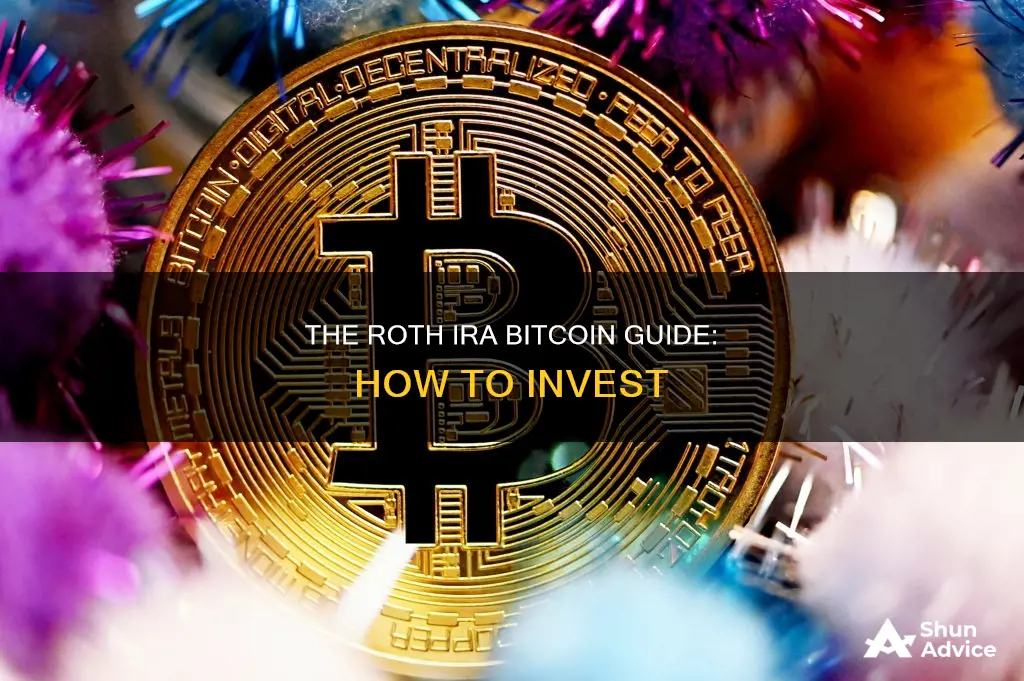
Investing in Bitcoin for retirement is an appealing prospect for many cryptocurrency enthusiasts. However, it's important to note that you cannot directly contribute Bitcoin to your Roth IRA due to IRS regulations. As a workaround, Bitcoin IRAs have emerged, allowing investors to include Bitcoin and other cryptocurrencies in their retirement portfolios. These self-directed IRAs enable investors to hold crypto in their accounts by purchasing it. However, finding a traditional IRA provider that allows this can be challenging. This has led to the rise of crypto IRA companies that specialise in facilitating cryptocurrency investments for retirement. While investing in Bitcoin through a Roth IRA can offer tax advantages and portfolio diversification, it also carries significant risks due to the volatile nature of cryptocurrencies.
| Characteristics | Values |
|---|---|
| Can you hold crypto in a Roth IRA? | Yes, but not with every provider. |
| How to invest in Bitcoin with a Roth IRA? | Open an account with a niche platform that offers it as an option. |
| Is it a good idea to invest in a Roth IRA? | It depends on your investment goals. Crypto is highly volatile and risky. |
| How does a Bitcoin IRA work? | You can opt for a traditional or a Roth IRA and access their substantial tax benefits. |
| What are the advantages of a Bitcoin IRA? | Diversification, potential returns, and tax advantages. |
| What are the disadvantages of a Bitcoin IRA? | Additional fees, crypto exchange limitations, price volatility, no tax loss harvesting, and retirement planning complexity. |
| How to open a Bitcoin IRA? | Locate a custodian to host your self-directed IRA and enable you to make cryptocurrency trades. |
| How to buy Bitcoin in a self-directed IRA? | Choose a custodian, open a self-directed IRA, fund your self-directed IRA, purchase Bitcoin, and store your Bitcoin. |
| Can you buy Bitcoin in a 401(k)? | Yes, but it's unlikely that you'll be offered the option. |
| Can you buy Bitcoin in a solo 401(k)? | Yes, some but not all plan providers let you hold cryptocurrency in solo 401(k) accounts. |
What You'll Learn

Understand the risks of investing in Bitcoin for retirement
Bitcoin and other cryptocurrencies have become increasingly popular as an investment option for retirement planning. However, it is important to understand the risks involved in investing in Bitcoin for retirement. Here are some key points to consider:
Volatility and Risk
Cryptocurrency markets are known for their high volatility, and Bitcoin is no exception. The price of Bitcoin can fluctuate significantly in a short period, making it a risky choice for retirement savings. For example, after a banner year in 2021, the crypto market suffered a significant downturn in 2022, with most major cryptocurrencies, including Bitcoin, falling by 65% or more. This volatility can have a detrimental impact on retirement savings, especially for those nearing retirement age.
Regulatory and Tax Landscape
The regulatory landscape for cryptocurrencies is still evolving, and the lack of comprehensive regulations makes this investment option more speculative. The absence of governing authority and traditional supply and demand fundamentals make cryptocurrencies highly unpredictable. Additionally, investing in Bitcoin through a self-directed IRA introduces additional IRS rules and regulations that must be considered.
Complexity and Accessibility
Investing in Bitcoin for retirement can be complex, especially when compared to traditional retirement investment options. It often involves multiple components, such as crypto exchanges, custodians, and secure storage solutions. The process of setting up and managing a Bitcoin IRA can be challenging and potentially expensive, requiring careful due diligence and research.
Limited Institutional Support
While there is a push to include cryptocurrencies in retirement plans, many financial institutions and employers are hesitant due to the fiduciary duty to protect their employees and customers. As a result, individuals interested in investing in Bitcoin for retirement may need to rely on a DIY approach, which can be riskier and more complicated.
Diversification Challenges
Bitcoin and cryptocurrencies are often touted as a diversification strategy for investment portfolios. However, the performance of Bitcoin has become more closely correlated with the broader market, particularly high-risk tech stocks. Therefore, investing in Bitcoin may not provide the diversification benefits that some investors expect.
In conclusion, while investing in Bitcoin for retirement may offer the potential for significant gains, it is essential to approach it with caution. Investors should carefully consider their risk tolerance, time horizon, and the potential impact on their overall retirement portfolio before allocating a small portion of their savings to Bitcoin or other cryptocurrencies. Diversification and a long-term investment mix are crucial to balancing the risks associated with this volatile asset class.
Coinbase Crypto Investment: Best Bets for Your Portfolio
You may want to see also

Learn about the tax advantages of a Roth IRA
A Roth IRA is a type of tax-advantaged individual retirement account that allows you to contribute after-tax dollars toward your retirement. Here are the key tax advantages of a Roth IRA:
Tax-Free Growth and Withdrawals:
With a Roth IRA, you contribute after-tax money to the account, so you don't get a tax deduction on your contributions as you would with a traditional IRA. However, the trade-off is that your money grows tax-free, and you can withdraw it tax-free at retirement (generally considered to be age 59 1/2 or older). This means that while you don't get an immediate tax benefit, you will ultimately benefit from tax-free withdrawals during retirement.
Pass Money to Heirs Tax-Free:
The Roth IRA is an excellent vehicle for wealth transfer, allowing you to pass any money in the account tax-free to your heirs. While the rules around inherited IRAs can be complex, distributions from inherited Roth IRAs generally remain tax-free. This provides your heirs with tax-free options for managing the money they inherit.
Penalty-Free Withdrawal of Contributions:
One of the most flexible features of a Roth IRA is the ability to withdraw contributions at any time without incurring taxes or penalties. This means that if you need emergency funds, you can access your contributions without the burden of additional taxes or early withdrawal penalties.
No Age Limit for Contributions:
Unlike some retirement accounts that have age restrictions, a Roth IRA has no age limit for contributions. As long as you have earned income from working, you can continue contributing to a Roth IRA regardless of your age. This makes it a valuable tool for older individuals who are still working and want to save for retirement.
No Required Minimum Distributions (RMDs):
Unlike traditional IRAs, 401(k)s, and Roth 401(k)s, a Roth IRA does not have required minimum distributions. This means you are not forced to withdraw money from your account annually, giving you more control over your retirement funds and allowing you to continue compounding your investments for as long as you like.
Invest in Bitcoin: Avoid Startup Fees and Get Started
You may want to see also

Find a Crypto IRA provider
To invest in Bitcoin using a Roth IRA, you will need to find a Crypto IRA provider. This is because, while it is possible to hold crypto in a Roth IRA, you cannot contribute crypto directly to your account.
When choosing a Crypto IRA provider, it is important to select a regulated and licensed company. You should also be aware of the fees involved, as these can be high and may include setup fees, transaction fees, and maintenance fees. Here are some of the Crypto IRA providers that you may want to consider:
- ITrustCapital: iTrustCapital offers some of the lowest fees in the industry, with a 1% transaction fee and no monthly or initial purchase fees. The company also allows clients to trade in 34 different cryptocurrencies, any time of day or night. iTrustCapital has a $1,000 minimum account requirement and a $30 trade minimum.
- Bitcoin IRA: Bitcoin IRA is a full-service Bitcoin IRA provider that offers 24/7 trading and secure cold storage for digital assets. The platform is easy to use and offers a wide selection of cryptocurrencies. However, it does have higher fees than some other providers. There is a $3,000 minimum to open a standard account, but the company also offers a Saver IRA with a $100 initial deposit and $100 per month recurring investment.
- BitIRA: BitIRA offers high levels of security for cryptocurrency transactions and storage, with multi-encryption encoding and offline cold storage. The company insures digital assets "end-to-end" and requires a $5,000 minimum investment amount to start an IRA.
- Equity Trust: Equity Trust has over 40 years of experience in self-directed IRAs and offers support for both traditional and alternative investments. The company charges annual administration fees between $225 and $2,250, depending on the account size, as well as a $50 setup fee. Equity Trust supports trading in up to eight cryptocurrencies and offers educational tools to help clients understand their investment options.
- Coin IRA: Coin IRA provides educational resources and specialised cryptocurrency retirement experts to help customers set up their accounts. The company offers investment and trading in various cryptocurrencies and has a $5,000 minimum investment requirement. There are no account setup, annual or monthly maintenance fees, or charges for insured cold storage.
- AltoIRA: AltoIRA offers access to over 200 cryptocurrencies, as well as other alternative investment options such as real estate and art. The platform utilises a combination of hot and cold storage and is integrated with Coinbase. There is a $10 monthly fee for the starter plan and a 1% fee for crypto transactions.
- Rocket Dollar: Rocket Dollar allows users to open a self-directed IRA or self-directed solo 401(k) to invest in various assets, including cryptocurrency. The platform has higher fees than some other providers and offers trading in three cryptocurrencies: Bitcoin, Ethereum, and Litecoin. There is no minimum opening deposit, but there is a $15 monthly fee for the Silver plan and a $30 monthly fee for the Gold plan.
It is important to carefully research and compare different Crypto IRA providers before making a decision, as the fees, features, and investment options can vary significantly.
Should You Invest in Bitcoin?
You may want to see also

Open a self-directed IRA
To open a self-directed IRA, you need to:
- Find a qualified IRA custodian that specializes in self-directed IRAs. These are generally only available through specialized firms that offer self-directed IRA custody services.
- Determine whether they offer the range of investments you want. Self-directed IRAs allow you to hold various alternative investments, including real estate, precious metals, commodities, private placements, limited partnerships, tax lien certificates, and other alternative investments.
- Set up the account and pay any fees. Self-directed IRAs have a complex fee structure, including a one-time establishment fee, a first-year annual fee, an annual renewal fee, and fees for investment bill-paying.
- Begin contributing to your account. Remember that self-directed IRAs are truly self-directed, so custodians aren't allowed to give financial advice.
It's important to note that self-directed IRAs are best suited for savvy investors who already understand alternative investments and want to diversify in a tax-advantaged account. The account holder is responsible for conducting their own research, due diligence, and management of assets. Additionally, there are other risks associated with self-directed IRAs, including the possibility of fraud and illiquid investments.
Gold Coin Investment: Which is the Best Buy?
You may want to see also

Fund your self-directed IRA
To fund your self-directed IRA, you will need to establish and fund a self-directed IRA with a custodian of retirement plans. This is a necessary step to holding cryptocurrency in a retirement account.
You will then need to form and register an LLC (limited liability company) that will be 100% owned by the IRA. This will carry the same tax-advantaged status as the IRA. The income and expenses related to the assets will flow through the IRA LLC as required by the Internal Revenue Service.
Next, using funds from the IRA, the LLC opens a business checking account. This is also referred to as a "checkbook IRA" and gives the account owner full control of the transaction. The funds in this account are for the sole purpose of investing in digital assets or other alternative assets allowed through self-direction.
You can then open an account on a cryptocurrency exchange in the name and tax number of the IRA LLC. Digital assets can be purchased through brokers or by investing in a fund that holds various digital currencies through private placement.
It is important to note that, as with all self-directed investments, the account holder should conduct full due diligence about any cryptocurrency they wish to include in their retirement account. While investments in digital currencies have the potential to be lucrative, cryptocurrencies are volatile and the market is unregulated.
There are a few different ways to fund a self-directed IRA. You can fund your account via a transfer, rollover, or cash contribution. For example, investors can roll over their existing IRAs and 401ks into a Bitcoin IRA.
The Crypto Investment Conundrum: Which Coin to Choose?
You may want to see also
Frequently asked questions
A Bitcoin IRA is a self-directed IRA that holds cryptocurrency. It can be a traditional or Roth IRA and offers the same tax benefits.
A Bitcoin IRA has three components: crypto exchanges, custodians, and secure storage solutions. Crypto exchanges facilitate buying and selling crypto. Custodians ensure your account adheres to IRS rules. Secure storage solutions protect your crypto from theft.
A Bitcoin IRA can provide diversification and the potential for high returns. It also offers tax advantages as buying and selling assets in an IRA shelters you from capital gains taxes.
Bitcoin IRAs typically come with additional fees, such as set-up fees, transaction fees, and annual account management fees. They also introduce substantial risk due to the volatility of cryptocurrencies.
To open a Bitcoin IRA, you need to locate a custodian that allows for cryptocurrency investment options. You will need your full legal name, address, Social Security number, and banking information. Be sure to compare fees and ensure the account types, exchanges, and cryptocurrencies offered align with your goals.







